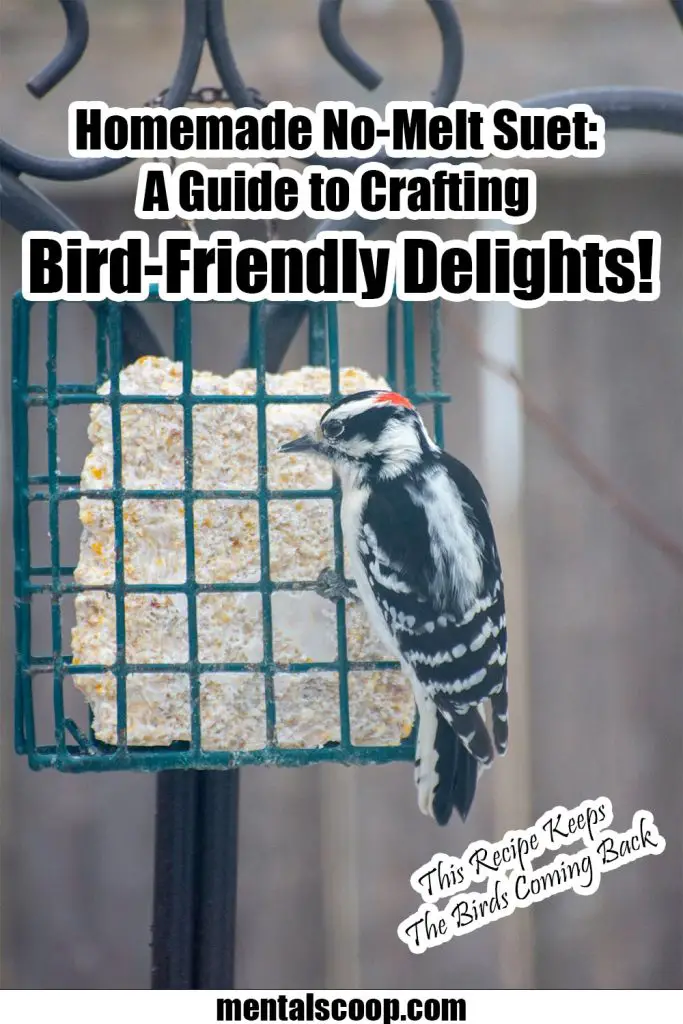Homemade No-Melt Suet: A Guide to Crafting Bird-Friendly Delights!

Watching birds visit your backyard can be a delightful experience, especially when you provide them with a nourishing treat like suet. Suet is a high-energy food source that helps birds thrive, particularly during colder months. While store-bought suet blocks are readily available, making your own no-melt suet can be a rewarding and cost-effective option.
In this article, we’ll explore the benefits of homemade suet and provide you with a detailed guide on how to create your own no-melt suet to attract a variety of feathered friends to your garden.
Understanding the Importance of Suet
Suet is a valuable source of nutrition for birds, especially during winter when natural food sources may be scarce. It is rich in fats, proteins, and calories, providing birds with the energy they need for warmth and survival. Suet attracts a wide range of species, including woodpeckers, nuthatches, chickadees, and thrushes, making it an excellent addition to any bird-friendly garden.
The Advantages of Homemade No-Melt Suet
While store-bought suet is readily available, making your own no-melt suet has several advantages. Firstly, homemade suet allows you to control the ingredients, ensuring that you provide a healthier and more natural food source for the birds. Additionally, creating your own suet can be a fun and educational project, involving the whole family in the process. Finally, homemade suet is often more cost-effective, as you can utilize kitchen scraps and pantry staples to create your bird-friendly delicacy.
Necessary Ingredients and Supplies
To make your own no-melt suet, you’ll need the following ingredients:
- 1 cup of high-quality birdseed (such as sunflower seeds, millet, or nyjer seeds)
- 1 cup of rendered suet or lard (available at butcher shops or supermarkets)
- 1 cup of peanut butter (preferably unsalted and unsweetened)
- 1 cup of cornmeal or oatmeal
- Optional add-ins: dried fruits, nuts, or mealworms
You will also need the following supplies:
- Mixing bowl
- Saucepan
- Measuring cups
- Spoon or spatula
- Cookie cutters or molds
- Twine or string (for hanging)
Step-by-Step Instructions
Prepare the suet mixture:
- In a saucepan, melt the suet or lard over low heat until it reaches a liquid consistency.
- Remove the saucepan from the heat and stir in the peanut butter until well combined.
- Gradually add the birdseed, cornmeal, and any optional add-ins, mixing thoroughly until the ingredients are evenly distributed.
Shape the suet:
- Allow the mixture to cool slightly until it thickens but remains workable.
- If using cookie cutters or molds, grease them lightly with vegetable oil to prevent sticking.
- Fill the molds with the suet mixture, pressing it down firmly to ensure a compact shape.
- Alternatively, you can shape the suet into small balls or logs using your hands.
Refrigerate and set:
- Place the filled molds or shaped suet onto a baking sheet lined with parchment paper.
- Transfer the baking sheet to the refrigerator and allow the suet to chill for at least 2-3 hours, or until it becomes firm.
Unmold and hang:
- Once the suet has solidified, remove the molds or gently unmold the shaped suet.
- If using cookie cutters, carefully push the suet out from the backside.
- Thread a piece of twine or string through each suet shape, creating a loop for hanging.
Feeding and Storage Tips
Hang the homemade no-melt suet in a suitable location where birds can easily access it, away from predators. Consider placing it near trees or shrubs to provide cover for the birds. Ensure that the suet feeder is clean and free from mold or contaminants.
Monitor the suet feeder regularly and replenish it as needed. In warmer climates or during summer months, store any unused suet in the refrigerator or freezer to prevent melting.

More interesting articles you may be interested in reading:

How To Remove A Tree Stump Painlessly
10 Vital Home Maintenance Tasks You’ll Regret If You Forget
See How Much Propane Is Left In A Tank With No Gauge
Thanks for reading and be sure to share this info with your friends using the social share buttons below.
Talking about social stuff, consider liking our Facebook page to keep up to date with our articles. Check out our other articles for more mental scoops!
